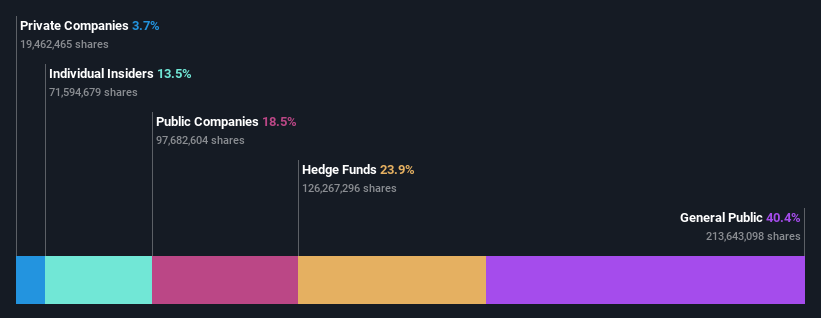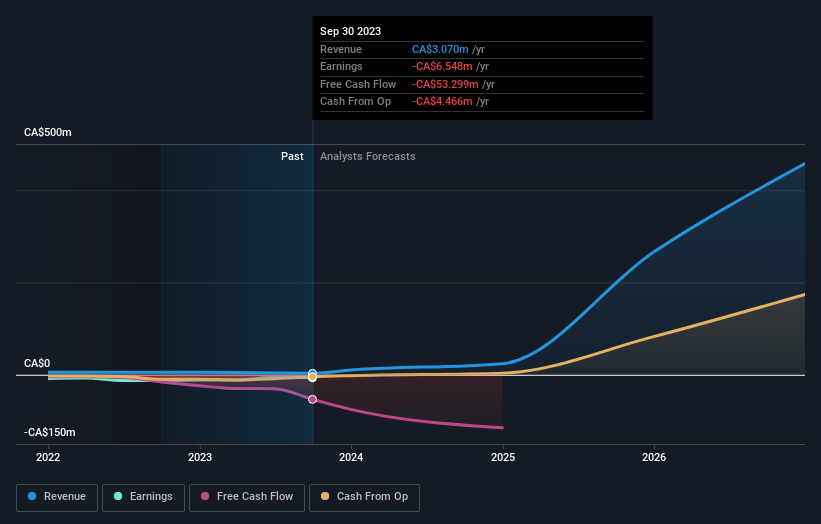- Canada
- /
- Oil and Gas
- /
- TSXV:CEI
Retail investors among Coelacanth Energy Inc.'s (CVE:CEI) largest shareholders, saw gain in holdings value after stock jumped 13% last week

Key Insights
- Significant control over Coelacanth Energy by retail investors implies that the general public has more power to influence management and governance-related decisions
- 50% of the business is held by the top 4 shareholders
- Insiders have been buying lately
A look at the shareholders of Coelacanth Energy Inc. (CVE:CEI) can tell us which group is most powerful. We can see that retail investors own the lion's share in the company with 40% ownership. Put another way, the group faces the maximum upside potential (or downside risk).
As a result, retail investors were the biggest beneficiaries of last week’s 13% gain.
Let's delve deeper into each type of owner of Coelacanth Energy, beginning with the chart below.
Check out our latest analysis for Coelacanth Energy

What Does The Lack Of Institutional Ownership Tell Us About Coelacanth Energy?
Small companies that are not very actively traded often lack institutional investors, but it's less common to see large companies without them.
There could be various reasons why no institutions own shares in a company. Typically, small, newly listed companies don't attract much attention from fund managers, because it would not be possible for large fund managers to build a meaningful position in the company. On the other hand, it's always possible that professional investors are avoiding a company because they don't think it's the best place for their money. Institutional investors may not find the historic growth of the business impressive, or there might be other factors at play. You can see the past revenue performance of Coelacanth Energy, for yourself, below.

It would appear that 24% of Coelacanth Energy shares are controlled by hedge funds. That worth noting, since hedge funds are often quite active investors, who may try to influence management. Many want to see value creation (and a higher share price) in the short term or medium term. GMT Capital Corp. is currently the company's largest shareholder with 24% of shares outstanding. Meanwhile, the second and third largest shareholders, hold 18% and 3.9%, of the shares outstanding, respectively. Raymond Hyer, who is the third-largest shareholder, also happens to hold the title of Member of the Board of Directors. In addition, we found that Robert Zakresky, the CEO has 3.7% of the shares allocated to their name.
Our research also brought to light the fact that roughly 50% of the company is controlled by the top 4 shareholders suggesting that these owners wield significant influence on the business.
While studying institutional ownership for a company can add value to your research, it is also a good practice to research analyst recommendations to get a deeper understand of a stock's expected performance. While there is some analyst coverage, the company is probably not widely covered. So it could gain more attention, down the track.
Insider Ownership Of Coelacanth Energy
While the precise definition of an insider can be subjective, almost everyone considers board members to be insiders. Management ultimately answers to the board. However, it is not uncommon for managers to be executive board members, especially if they are a founder or the CEO.
Most consider insider ownership a positive because it can indicate the board is well aligned with other shareholders. However, on some occasions too much power is concentrated within this group.
It seems insiders own a significant proportion of Coelacanth Energy Inc.. Insiders own CA$56m worth of shares in the CA$412m company. We would say this shows alignment with shareholders, but it is worth noting that the company is still quite small; some insiders may have founded the business. You can click here to see if those insiders have been buying or selling.
General Public Ownership
With a 40% ownership, the general public, mostly comprising of individual investors, have some degree of sway over Coelacanth Energy. This size of ownership, while considerable, may not be enough to change company policy if the decision is not in sync with other large shareholders.
Private Company Ownership
We can see that Private Companies own 3.7%, of the shares on issue. It's hard to draw any conclusions from this fact alone, so its worth looking into who owns those private companies. Sometimes insiders or other related parties have an interest in shares in a public company through a separate private company.
Public Company Ownership
It appears to us that public companies own 18% of Coelacanth Energy. We can't be certain but it is quite possible this is a strategic stake. The businesses may be similar, or work together.
Next Steps:
It's always worth thinking about the different groups who own shares in a company. But to understand Coelacanth Energy better, we need to consider many other factors. For example, we've discovered 3 warning signs for Coelacanth Energy (1 shouldn't be ignored!) that you should be aware of before investing here.
Ultimately the future is most important. You can access this free report on analyst forecasts for the company.
NB: Figures in this article are calculated using data from the last twelve months, which refer to the 12-month period ending on the last date of the month the financial statement is dated. This may not be consistent with full year annual report figures.
New: AI Stock Screener & Alerts
Our new AI Stock Screener scans the market every day to uncover opportunities.
• Dividend Powerhouses (3%+ Yield)
• Undervalued Small Caps with Insider Buying
• High growth Tech and AI Companies
Or build your own from over 50 metrics.
Have feedback on this article? Concerned about the content? Get in touch with us directly. Alternatively, email editorial-team (at) simplywallst.com.
This article by Simply Wall St is general in nature. We provide commentary based on historical data and analyst forecasts only using an unbiased methodology and our articles are not intended to be financial advice. It does not constitute a recommendation to buy or sell any stock, and does not take account of your objectives, or your financial situation. We aim to bring you long-term focused analysis driven by fundamental data. Note that our analysis may not factor in the latest price-sensitive company announcements or qualitative material. Simply Wall St has no position in any stocks mentioned.
About TSXV:CEI
Coelacanth Energy
An oil and natural gas company, engages in the acquisition, development, exploration, and production of oil and natural gas reserves in northeastern British Columbia, Canada.
Adequate balance sheet minimal.

